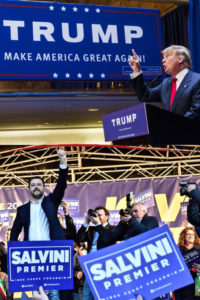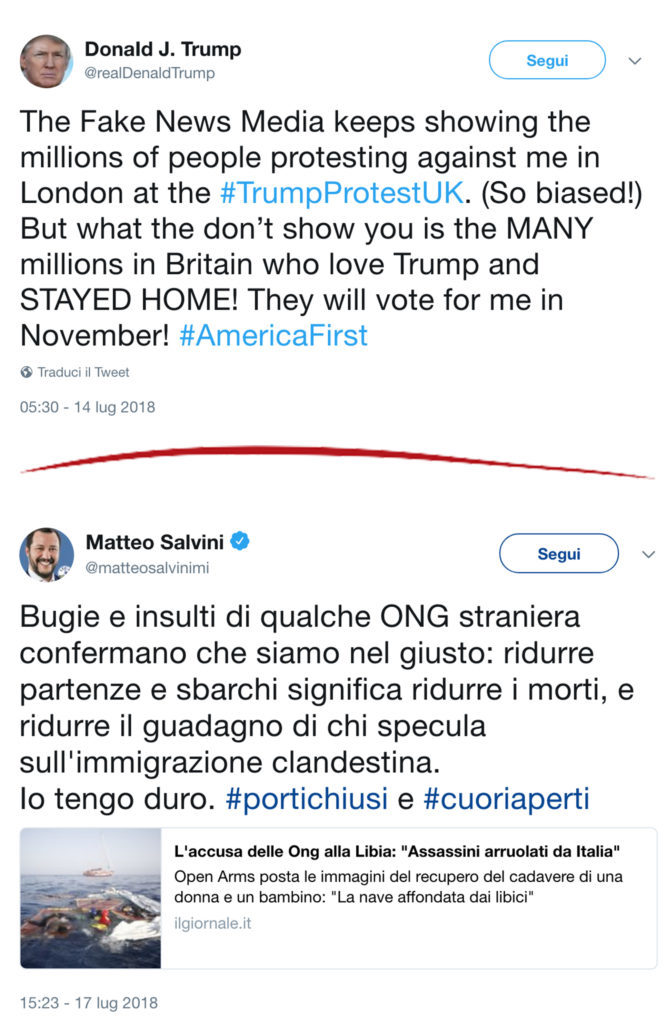Learning from “Donald”! The many analogies between Salvini and Trump’s PR
The leader of Lega and minister for internal affairs of the yellow-green government lead by Conte has recently been in the spotlight for his stance towards the issue of the Aquarius, the ship which rescued 692 migrants in the Mediterranean. His communications strategy and talking points bring to mind those of another leader, the President of the United States.
Dark suit, an Alberto da Giussano pin, crossed arms and a hard gaze. Down below, at waist height, a red band with the catchphrase #chiudiamoiporti (we shall close the ports). This how Matteo Salvini, the leader of Lega and minister for internal affairs of the government lead by Conte, has portrayed himself since the incident of the ship Aquarius with its 629 migrants on board. Such an imagery inspired mixed feelings in the public opinion, both domestic and international. Since the successful re-routing of the ship towards Valencia, which he saluted with a “VICTORY!” (in CAPS LOCK in the original tweet), Salvini has been in complete control of the government’s political agenda, with his wild claims on social media often hinting at his next move. Thanks to this strategy he has been able to “hook” both the public and the media, which is now “forced” to adapt a Manichaean storytelling that knows no middle ground: good guys vs bad guys, “dad with common sense” vs “intellectuals with a security detail”, the “wholesome people of the web” vs the “fake news manufacturing mainstream media”.
We are under the impression that Matteo Salvini has been acting – to be clear, knowingly – as if the electoral race never really ended. It seems also apparent how much his communications strategy owes the one used by the American president Donald Trump.
«IMITATION IS THE SINCEREST FORM OF FLATTERY». As the journalist Roberto Gervaso used to say, quoting Wilde. One could sense that this was very much the case for Salvini since the race for the Italian elections of the 4th of March. “Italians first” – in stark contrast with “immigrants stealing Italian’s jobs” and the ONGs “complicit in human trafficking and in the immigration business”- evokes the slogan “America first” employed by the American tycoon to win the presidential election in the US. An impression reinforced by the use of the same visual style: name and slogan framed in white on a blue background.

The analogies do not end here: the use of language is also quite similar, as the sentiment analysis of their campaigns reveals. Let’s compare Salvini’s “#chiudiamoiporti” with TheDonald’s proposal to build a wall along the Mexican border: «I will build a great wall – and nobody builds walls better than me, believe me – and I’ll build them very inexpensively. I will build a great, great wall on our southern border, and I will make Mexico pay for that wall. Mark my words».
This is an aggressive use of words. To identify an “enemy” was a standard practice in negative campaigns in the US between 1952 and 1996, but has been rising in popularity thanks to the internet and its use has peaked since the 2008 crisis, spreading to Europe. Trump is well known for adopting an unusual vocabulary when it comes to dealing with his rivals: he attacks them directly, often with complete disregard for political correctness. During the presidential campaign, the New York Times published the “The 305 People, Places and Things Donald Trump Has Insulted on Twitter”, which lists the catchphrases the candidate used without pause. The most recurring are “puppet”, “dummy”, “phony”, “loser”, “incompetent”, “sad” and “crooked”, aimed mainly at his chief opponent Hillary Clinton. Likewise, whoever opposes Salvini is called “buonista” (a bleeding heart), “radical chic” (a cultural leftist) or “razzista verso gli italiani” (a racist towards Italians).

THE IMPORTANCE OF HASHTAGS As we already noted, social media are at the centre of the strategies of both leaders and the use of hastags plays a big role in delivering messages on these platforms. While other politicians cling to the intricate political jargon, both Trump and Salvini resort to a simple, plain and understandable language. During his first one hundred days in office, the American president has been using expressions like #MAGA (“Make America Great Again”), #AmericaFirst, #ICYMI (internet culture slang, meaning “in case you missed it” and used to reinforce a statement), #USA and #ObamaCare (which he “finally demolished”). As a newly appointed minister, Salvini has started focusing his posts on a specific topic, using phrases like #IoStoconChiCiDifende (I stand with those who defend us), #PrimagliItaliani (Italians first), #StopInvasione (stop the invasion) and the ever popular #Ruspa (bulldozer).
«I’m working to make up for years of ineffectiveness and do-goodism. We shall close the ports! », Salvini said repeatedly over the last few months; «Mexico will pay for the wall! » used to declare Trump. «A coincidence? I don’t think so», as Adam Kadmon solemnly said.
Translated into English by Francesco Raciti



